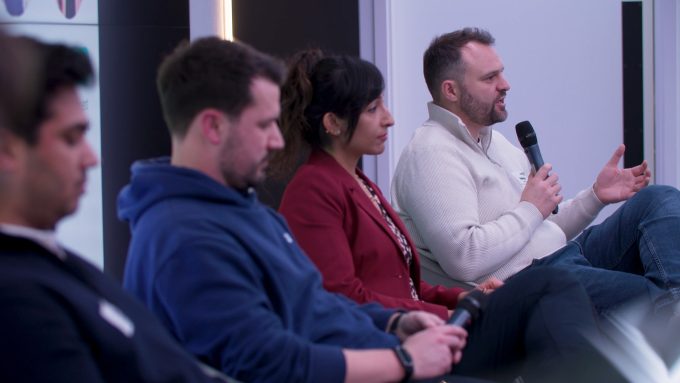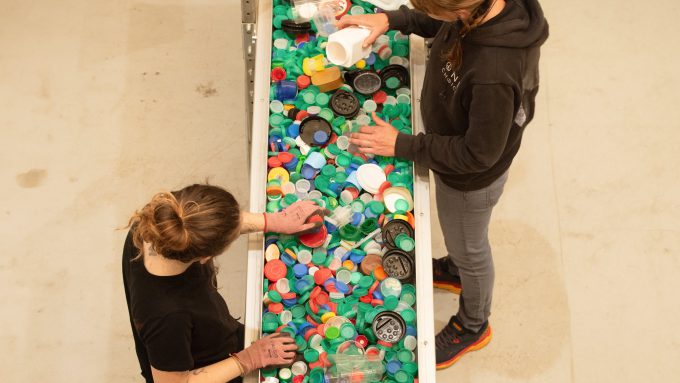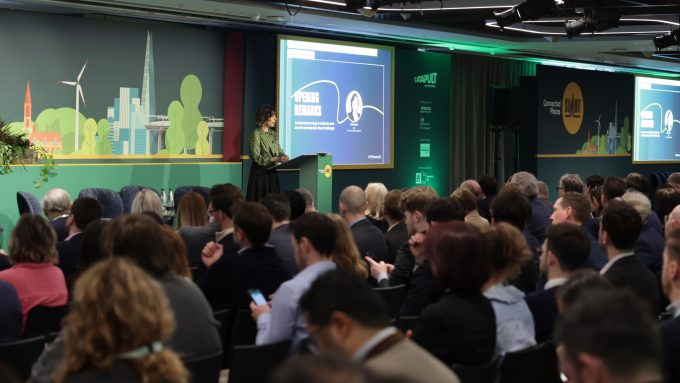
Meet the innovator predicting traffic at ports

Twists and turns characterise the career trajectories of many successful entrepreneurs; not least the technology specialist and innovator Toby Mills. A decade ago the “obsessive with a short attention span” developed a pet tracker to help locate lost dogs, before creating a similar device to keep an eye on goods travelling between breweries and pubs, and from warehouses to supermarkets.
More recently he has worked with Connected Places Catapult through the Freight Innovation Fund to develop a concept called ‘micromodels’ which build on a ‘data orchestration’ platform he launched four years ago. These micromodels can help to monitor the movement of lorries on motorways, and have been used to provide predictive intelligence to the Port of Dover, allowing it to better manage the arrival of freight and reduce congestion. Development of the product was taken forward through the Freight Innovation Fund Accelerator.
His start-up firm Entopy is looking to transfer the micromodels concept across other aspects of port operations and into neighbouring sectors, such as aviation. Entopy has recently been accepted onto Connected Places Catapult’s Glasgow Airport ‘Living Lab’ digital twin project, enabling operational and strategic intelligence around passenger movements through the terminal, in order to better manage the use of space.
But the story does not end there: Toby is talking with several local authorities about how its system could help better manage traffic, and reduce pollution at protected environmental sites.
Entopy makes sense of large quantities of complex, disparate information to help clients make decisions. It builds AI-enabled digital twins that combine with real-time data to create models that deliver intelligence.
“We focus on real-time and historic data to provide future predictions,” he explains.

Early career challenges
Toby started his career in middle management with a large corporate firm after completing his A-levels. Some colleagues seemed more interested in covering their backs than actually achieving anything, he remembers. “It became incredibly frustrating, and I thought this was not what I wanted to do with my life. But I was lucky to have a father who financially supported my wacky idea of placing sensors on virtually everything to digitise the world.”
Toby identified there may be a business opportunity in tracking; to prevent valuable items – including pets – from getting lost, and got involved in the emerging area of Internet of Things (IoT) connected devices. He bought 1000 trackers designed to fit onto dog collars from a Chinese manufacturer and launched a business the following year. But he “spent a fortune” on television advertising before he could prove his product was market ready.
“Within a year, I identified that the business wasn’t sustainable or scalable,” he remembers. “There was no subscription fee, so there was no recurring revenue.”
He then happened to speak to an associate who worked for a media company supplying promotional stands for products in supermarkets. His contact told him that a high number of stands were either not arriving or were found languishing in back rooms. Another conversation with a manager at a brewery revealed that kegs of beer delivered from a wholesaler were sometimes being lost. What if technology could track the shipment of promotional stands to supermarkets and beer to the point of sale, Toby wondered.
He took apart one of his dog collars, fitted a much larger battery and explored the idea of creating more versatile units to track goods through a supply chain. Trials went well and he realised that large quantities of data were also being collated from his operation.
The value proposition of the business – combining tracking with predictive analysis – started to become clearer, but Toby needed to raise money so approached a series of angel investors and secured £500,000. He recruited two colleagues, together they founded Entopy and the trio spent a couple of years developing their own IoT device using GPS technology.
Five years ago, Toby approached his local MP and Cabinet Minister at the time who gave him the confidence to push forward with his growth plans. Entopy started working with a large IT company which saw the value in the orchestration software more than the IoT hardware that Toby had developed, which led him to double down on the software platform.
Helping to reduce Dover congestion
Through the Freight Innovation Fund – funded by the Department for Transport – the Catapult connected Entopy with the Port of Dover to deliver a six month pilot using its software to predict freight movements heading to the port, which receives around 10,000 lorries a day.
The system has AI machine learning models deployed at 15 different locations on the strategic road network in Kent, which predict traffic levels at each site up to two weeks in advance based on the weather, time, day of the week and season.
This information is combined with real-time events such as traffic accidents and roadworks, delivering dynamic predictive intelligence regarding freight traffic flows to the port; showing likely traffic volumes arriving in 15 minute intervals.
Use of the predictive traffic model helped Dover reduce the number of times it had to implement a regime called ‘TAP’ or Traffic Assessment Project; a temporary vehicle management system that queues lorries destined for the port during times of heavy congestion.
“The Freight Innovation Fund gave the Port of Dover the opportunity to try us out without too much risk, and us the opportunity to further develop our system.”Toby Mills, founder of Entopy
Entopy is also talking to several other ports across the UK and Europe and one county council; with a view to looking at ways to further develop its micromodel platform and scale its operations.

Looking to the future
With several opportunities to look forward to, future prospects are good. But reaching this point has been hard work. “Getting the company to where it is now has been a big effort; but it takes a lot to keep me down,” Toby says. “I work with some incredibly intelligent people but if I don’t understand what they are doing, they will run rings around me! So almost by necessity, I am curious and interested in what they are doing.
“Being the chief executive of a start-up could be very lonely – and ultimately the buck stops with you. But if your team wants to succeed and you treat everyone right; you are not lonely at all. I’d like to say I’m enthusiastic and passionate about what I do.”
Toby is upbeat about the coming year. “We are currently in talks with a number of ports both in the UK and overseas. Success will mean not only a decent return for my shareholders, but also helping to make a genuine impact.”
And to younger entrepreneurs hoping to follow his lead, Toby has this advice: “Don’t overthink what you are doing; just follow your feet. Get your boat in the water as quickly as you can, because that’s when you start learning.”
Find out more about the Freight Innovation Fund.





